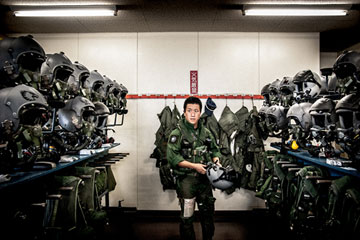
These days, Japanese pilot Kohta "Vader" Araki, who flies F-15s, is always on alert.
(3 of 4)
The LDP has pitched Abe's security fixation as self-preservation. "We would be happy if everyone in the world is good, and therefore we have no military force," says LDP secretary general Ishiba. "However, our world doesn't work that way." Certainly, Japan lives in a nervous neighborhood that includes a nuclear North Korea and a China that is rapidly expanding its own military while fueling anti-Japanese fervor. In January, a Chinese frigate locked weapons-targeting radar on a Japanese destroyer in the Senkaku-Diaoyu area, often a precursor to a strike. (The Chinese vessel eventually stood down.) "The Northeast Asia security environment has dramatically changed," says Satoshi Morimoto, a former Japanese Defense Minister. "I don't think Abe is a rightist. He is a reasonable political leader trying to protect our territory."
Japan's official position on the disputed isles — which are located in waters rich in oil and natural gas — is that, well, it hasn't budged one bit. "Japan has never changed our attitude toward issues of our territorial waters and land," Defense Minister Itsunori Onodera tells TIME. "It is China today that is trying to change this." But the latest tensions ratcheted up after the Japanese government nationalized three of the contested islands a year ago. The purchase was aimed, says the Japanese government, at preventing the islands from falling into the hands of Tokyo's nationalist governor, who was threatening to buy the outcroppings from their private Japanese owners. (The tiny islands are also claimed by Taiwan.) Beijing took exception to the nationalization, and forays by Chinese planes and vessels have increased markedly since then. Abe's administration is now considering stationing personnel on the disputed isles, which have been uninhabited since before World War II — a move that will surely further anger the Chinese. "We can't avert our eyes from the reality: a flurry of provocations against our country's sovereignty," Abe said in mid-September, referring to Japan's territorial spat with China. "I'm pushing for the regeneration of our country's security by looking squarely at reality."
Man With a Past
With his soft face and panda-set eyes, Abe, 59, is known as an obotchan, which roughly translates to "little boy," referring to his privileged lineage as the son of a Foreign Minister and the grandson of a Prime Minister. In truth, there aren't many leading politicians in Japan today who aren't obotchan — nepotism flourishes in Tokyo's halls of power. But Abe seems particularly weighted with a sense of his conservative family's mission, particularly his grandfather Nobusuke Kishi's desire to amend Article 9 of the constitution, which is read as banning Japan from possessing an offensive military force. "From a young age, Abe had it in his mind that he would be the one who would bring the postwar regime to an end," says Hitoshi Tanaka, a former Deputy Foreign Minister.
Abe's sense of history and destiny for Japan backfired for him during his first stint as PM. "Abe misread the public mood about nationalism," says politics professor Nakano. "People were more concerned about the economy, and he focused on the wrong thing." Abe's popularity plunged, even as he pursued a patriotic agenda and supported a textbook that played down Japanese wartime atrocities. A year after taking office, amid financial scandals involving his Cabinet members, Abe resigned in tears. He later blamed a rare intestinal ailment for his retreat.
Abe's surprise exit was hardly the kind of fortitude expected from a young political shogun. In his 2.0 version, he continues to sound the nationalist bell. In 2012, he visited the controversial Yasukuni Shrine, where Japan's war dead, including top war criminals, are memorialized — although he has so far declined to worship there while serving as Prime Minister. (Abe's grandfather Kishi was arrested as a suspected war criminal by Allied occupation forces but never charged.) During last year's political campaign, Abe suggested the need to revise two official Japanese apologies for the nation's cruel wartime record, including one for the imperial Japanese army's systematic sexual enslavement of Asian "comfort women."
This time, however, Abe's popularity is high. About 7 in 10 Japanese have a favorable opinion of him, according to a July Pew poll — unusually robust in a nation that serially dumps its leaders after brief periods in office. In May, a self-assured Abe was even moved to clamber into the cockpit of a Japanese military jet and flash a thumbs-up sign. The resulting image wasn't quite Michael Dukakis in a tank. But the notion of Abe as proud commander in chief felt forced — and it didn't help neighborly relations that the jet trainer chosen for the photo op was numbered 731, the same digits as a notorious Japanese military unit that unleashed germ warfare on Manchuria.
Anti-Chinese sentiment is soaring in Japan. Nevertheless, a significant percentage of Japanese remain allergic to any military buildup, particularly those who personally experienced the ravages of war. Only a minority of Japanese support constitutional revision. There is also a grudging understanding that Japan — especially an aging, depopulating Japan — needs China economically far more than the other way around. "Our biggest national interest is reviving our economy, and Japan is not in a position to be isolated by this question of [wartime] history," says former Deputy Foreign Minister Tanaka. "I am very concerned about these careless right-wing statements by people inside government."
